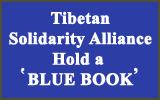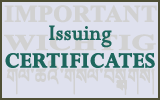Remembering Kunchok Jinpa and Tibetan citizen journalists; China amongst Worst Violators of Press Freedom

Geneva: Today on World Press Freedom Day, we remember Kunchok Jinpa who was tortured to death in custody by Chinese authorities for sharing information on Tibet as well as Tibetan citizen journalists imprisoned by Chinese authorities including Gopey Tsang Kunchok Tsephel, Tsomo Dawa and Lobsang Jamyang.
The Reporters without Borders (RSF) ranks China amongst the world’s worst violators of press freedom. China ranks 177 out of 180 countries in the 2021 World Press Freedom Index and is categorized in the “black zone- very serious situation.” China is ranked worse than Saudi Arabia (170), Cuba (171), Syria (173) and Iran (174) and is closely ranked with North Korea (179) and Eritrea (180). According to the World Press Freedom Index report, China has imprisoned 73 journalists- the highest number of imprisoned journalists in the world, more than twice the number by Saudi Arabia (32), Myanmar (31) and Egypt (31); 10 times more than Russia (7) and 73 times more than North Korea (1). China also has the highest number of imprisoned citizen journalists in the world- 42, twice the number by Vietnam (21), thrice the number by Syria (14) and 42 times more than Russia (1).
In its recently published 2020 annual report titled “Track, Trace, Expel: Reporting on China Amid a Pandemic,” the Foreign Correspondents Club of China (FCCC) noted that “China dramatically stepped up efforts in 2020 to frustrate the work of foreign correspondents.” The report highlighted that China used all arms of state power including surveillance system to harass and intimidate journalists. The report further noted that access to “Tibet Autonomous Region” (TAR) continues to be restricted for foreign journalists and despite the US legislation Reciprocal Access to Tibet Act passed in 2018, the US correspondents and outlets were not allowed access to “TAR” or other Tibetan areas. The FCCC also tweeted saying “China actively stymies reporting in border regions, including Tibet.”
Following the report, China slammed the FCCC as “illegal organization” and claimed that “foreign journalists in China should feel lucky” thereby proving China’s systemic persecution of foreign journalists who report countering China’s official lines. Even BBC China’s correspondent John Sudworth was forced to relocate to Taiwan after credible threats against him. The threat of China to freedom of press is not just within its borders. As per RSF report published in 2019, “China’s Pursuit of a New World Media Order” China is trying to export its oppressive model to create a new world media order under its influence.
The RSF has categorized Kunchok Jinpa as Tibetan news provider and has counted his death under “media assistants” killed in China. Kunchok Jinpa suffered brain haemorrhage and was paralyzed due to torture inflicted on him in custody. He died on 6 February 2021 at age 51. He was serving 21-year arbitrary sentence for providing news on peaceful protests organized by Tibetans against Chinese authoritarian rule.
Similarly, Kunchok Tsephel Gopey Tsang was imprisoned on 26 February 2009 for hosting a website on Tibetan cultural issues called Choeme. He was sentenced to 15 years of imprisonment on charges of “leaking state secrets.” Lobsang Jamyang, was imprisoned on 17 April 2015 for publishing articles critical of the Chinese government’s policies in Tibet including on “environmental degradation, restrictions on speech and the causes of self-immolations and other protests in 2008.” He has published a critical book titled “Surge of Yellow Mist” and also contributed to Tibetan websites like Choeme, Sengdor and the blog Tsongon. Tsomo Dawa was imprisoned on 23 August 2014 for publishing politically sensitive articles online.
The Tibet Bureau Geneva expresses deep concerns on the severe violations of press freedom by China including persecution of journalists, citizen journalists and media assistants. Tibet is often considered much worse than North Korea in terms media accessibility and sharing of information. The names mentioned above are only a few reported cases with actual numbers very likely to be much higher.
Today on the World Freedom of the Press Day, the Tibet Bureau Geneva, therefore, calls upon the UN especially the UN High Commissioner for Human Rights as well as Special Rapporteurs including on freedom of speech and expression; and the international community to monitor, report and call upon China to guarantee and safeguard press freedom. We further call for the release of all the journalists, citizen journalists as well as media assistants imprisoned by China and to stop their persecution and killings.




